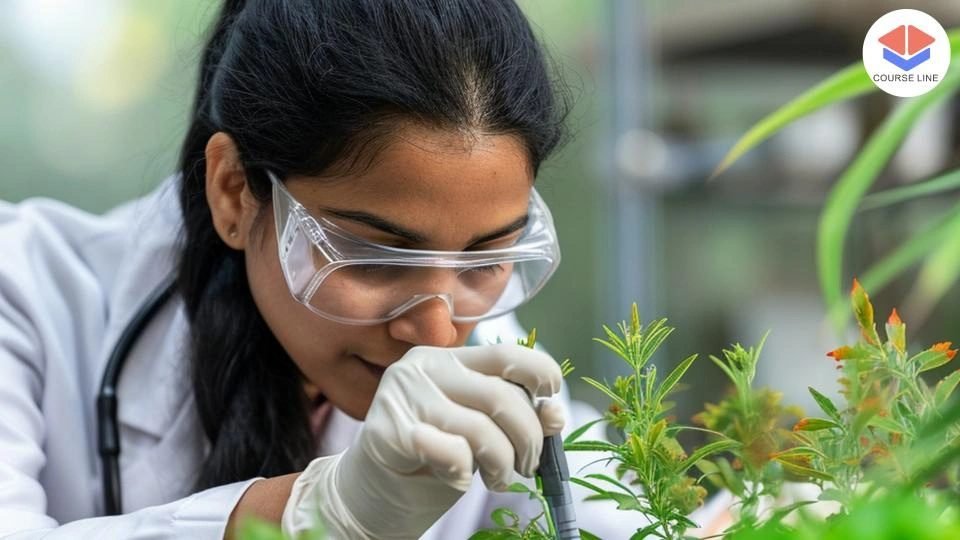Course Features
Price
Study Method
Online | Self-paced
Course Format
Reading Material - PDF, article
Duration
3 hours, 55 minutes
Qualification
No formal qualification
Certificate
At completion
Additional info
Coming soon
- Share
Overview
The Plant Pathology Research and Management course is designed for learners passionate about understanding and combating plant diseases through modern research and effective management strategies. It provides a comprehensive look at the science behind plant pathology and equips students with the skills to identify, diagnose, and control plant health problems across various ecosystems.
You’ll begin with a foundational understanding of what plant pathology entails, including its historical evolution and why plant health is crucial for food security, biodiversity, and sustainable land management. The course then focuses on plant diseases specific to the UK, covering the most common pathogens, how they spread, and the symptoms used for diagnosis.
As research plays a critical role in managing plant health, you will gain hands-on insights into plant pathology research techniques, including laboratory diagnostics, field data collection, and molecular biology methods such as PCR and DNA sequencing. These tools are vital for identifying pathogens accurately and understanding disease dynamics.
The course also delves into disease management strategies, combining traditional and modern approaches. You'll learn about cultural control methods, the use of pesticides and fungicides, biological agents like beneficial microbes, and the implementation of Integrated Pest Management (IPM) frameworks that balance efficacy with sustainability.
Through real-world case studies, the course illustrates the challenges and successes of managing plant diseases in agricultural crops and ornamental plants. This practical perspective helps contextualise theoretical knowledge in everyday scenarios faced by plant health professionals.
In the final module, the course looks ahead to emerging issues in plant pathology, including the impact of climate change on disease patterns, the development of sustainable practices, and the need for innovative, eco-friendly disease control methods. Learners will leave equipped with the tools and knowledge to actively contribute to safeguarding plant health.
This course is ideal for aspiring plant pathologists, agricultural and environmental science students, horticulturists, researchers, and professionals in plant health and pest management sectors looking to expand their expertise in plant disease identification and sustainable management.
A basic understanding of biology or life sciences is recommended. Familiarity with laboratory or agricultural terminology will be helpful but is not mandatory, as all key concepts are explained in an accessible manner.
Graduates can pursue roles such as plant health inspector, agricultural researcher, plant pathologist, horticultural consultant, or work in government, environmental NGOs, or agri-tech firms focusing on plant disease research and sustainable crop management.
Who is this course for?
The Plant Pathology Research and Management course is designed for learners passionate about understanding and combating plant diseases through modern research and effective management strategies. It provides a comprehensive look at the science behind plant pathology and equips students with the skills to identify, diagnose, and control plant health problems across various ecosystems.
You’ll begin with a foundational understanding of what plant pathology entails, including its historical evolution and why plant health is crucial for food security, biodiversity, and sustainable land management. The course then focuses on plant diseases specific to the UK, covering the most common pathogens, how they spread, and the symptoms used for diagnosis.
As research plays a critical role in managing plant health, you will gain hands-on insights into plant pathology research techniques, including laboratory diagnostics, field data collection, and molecular biology methods such as PCR and DNA sequencing. These tools are vital for identifying pathogens accurately and understanding disease dynamics.
The course also delves into disease management strategies, combining traditional and modern approaches. You'll learn about cultural control methods, the use of pesticides and fungicides, biological agents like beneficial microbes, and the implementation of Integrated Pest Management (IPM) frameworks that balance efficacy with sustainability.
Through real-world case studies, the course illustrates the challenges and successes of managing plant diseases in agricultural crops and ornamental plants. This practical perspective helps contextualise theoretical knowledge in everyday scenarios faced by plant health professionals.
In the final module, the course looks ahead to emerging issues in plant pathology, including the impact of climate change on disease patterns, the development of sustainable practices, and the need for innovative, eco-friendly disease control methods. Learners will leave equipped with the tools and knowledge to actively contribute to safeguarding plant health.
This course is ideal for aspiring plant pathologists, agricultural and environmental science students, horticulturists, researchers, and professionals in plant health and pest management sectors looking to expand their expertise in plant disease identification and sustainable management.
A basic understanding of biology or life sciences is recommended. Familiarity with laboratory or agricultural terminology will be helpful but is not mandatory, as all key concepts are explained in an accessible manner.
Graduates can pursue roles such as plant health inspector, agricultural researcher, plant pathologist, horticultural consultant, or work in government, environmental NGOs, or agri-tech firms focusing on plant disease research and sustainable crop management.
Requirements
The Plant Pathology Research and Management course is designed for learners passionate about understanding and combating plant diseases through modern research and effective management strategies. It provides a comprehensive look at the science behind plant pathology and equips students with the skills to identify, diagnose, and control plant health problems across various ecosystems.
You’ll begin with a foundational understanding of what plant pathology entails, including its historical evolution and why plant health is crucial for food security, biodiversity, and sustainable land management. The course then focuses on plant diseases specific to the UK, covering the most common pathogens, how they spread, and the symptoms used for diagnosis.
As research plays a critical role in managing plant health, you will gain hands-on insights into plant pathology research techniques, including laboratory diagnostics, field data collection, and molecular biology methods such as PCR and DNA sequencing. These tools are vital for identifying pathogens accurately and understanding disease dynamics.
The course also delves into disease management strategies, combining traditional and modern approaches. You'll learn about cultural control methods, the use of pesticides and fungicides, biological agents like beneficial microbes, and the implementation of Integrated Pest Management (IPM) frameworks that balance efficacy with sustainability.
Through real-world case studies, the course illustrates the challenges and successes of managing plant diseases in agricultural crops and ornamental plants. This practical perspective helps contextualise theoretical knowledge in everyday scenarios faced by plant health professionals.
In the final module, the course looks ahead to emerging issues in plant pathology, including the impact of climate change on disease patterns, the development of sustainable practices, and the need for innovative, eco-friendly disease control methods. Learners will leave equipped with the tools and knowledge to actively contribute to safeguarding plant health.
This course is ideal for aspiring plant pathologists, agricultural and environmental science students, horticulturists, researchers, and professionals in plant health and pest management sectors looking to expand their expertise in plant disease identification and sustainable management.
A basic understanding of biology or life sciences is recommended. Familiarity with laboratory or agricultural terminology will be helpful but is not mandatory, as all key concepts are explained in an accessible manner.
Graduates can pursue roles such as plant health inspector, agricultural researcher, plant pathologist, horticultural consultant, or work in government, environmental NGOs, or agri-tech firms focusing on plant disease research and sustainable crop management.
Career path
The Plant Pathology Research and Management course is designed for learners passionate about understanding and combating plant diseases through modern research and effective management strategies. It provides a comprehensive look at the science behind plant pathology and equips students with the skills to identify, diagnose, and control plant health problems across various ecosystems.
You’ll begin with a foundational understanding of what plant pathology entails, including its historical evolution and why plant health is crucial for food security, biodiversity, and sustainable land management. The course then focuses on plant diseases specific to the UK, covering the most common pathogens, how they spread, and the symptoms used for diagnosis.
As research plays a critical role in managing plant health, you will gain hands-on insights into plant pathology research techniques, including laboratory diagnostics, field data collection, and molecular biology methods such as PCR and DNA sequencing. These tools are vital for identifying pathogens accurately and understanding disease dynamics.
The course also delves into disease management strategies, combining traditional and modern approaches. You'll learn about cultural control methods, the use of pesticides and fungicides, biological agents like beneficial microbes, and the implementation of Integrated Pest Management (IPM) frameworks that balance efficacy with sustainability.
Through real-world case studies, the course illustrates the challenges and successes of managing plant diseases in agricultural crops and ornamental plants. This practical perspective helps contextualise theoretical knowledge in everyday scenarios faced by plant health professionals.
In the final module, the course looks ahead to emerging issues in plant pathology, including the impact of climate change on disease patterns, the development of sustainable practices, and the need for innovative, eco-friendly disease control methods. Learners will leave equipped with the tools and knowledge to actively contribute to safeguarding plant health.
This course is ideal for aspiring plant pathologists, agricultural and environmental science students, horticulturists, researchers, and professionals in plant health and pest management sectors looking to expand their expertise in plant disease identification and sustainable management.
A basic understanding of biology or life sciences is recommended. Familiarity with laboratory or agricultural terminology will be helpful but is not mandatory, as all key concepts are explained in an accessible manner.
Graduates can pursue roles such as plant health inspector, agricultural researcher, plant pathologist, horticultural consultant, or work in government, environmental NGOs, or agri-tech firms focusing on plant disease research and sustainable crop management.
-
- What is Plant Pathology? 00:10:00
- Importance of Plant Health 00:10:00
- Historical Perspective of Plant Pathology 00:10:00
-
- Common Plant Diseases in the UK 00:10:00
- Pathogens Causing Plant Diseases 00:10:00
- Symptoms and Diagnosis 00:10:00
- Laboratory Techniques 00:10:00
- Field Surveys and Data Collection 00:10:00
- Molecular Techniques 00:10:00
- Case Study 1 – Managing Crop Diseases 00:10:00
- Case Study 2 – Ornamental Plant Disease Management 00:10:00
- Exam of Plant Pathology Research and Management 00:50:00

No Reviews found for this course.
Is this certificate recognized?
Yes, our premium certificate and transcript are widely recognized and accepted by embassies worldwide, particularly by the UK embassy. This adds credibility to your qualification and enhances its value for professional and academic purposes.
I am a beginner. Is this course suitable for me?
Yes, this course is designed for learners of all levels, including beginners. The content is structured to provide step-by-step guidance, ensuring that even those with no prior experience can follow along and gain valuable knowledge.
I am a professional. Is this course suitable for me?
Yes, professionals will also benefit from this course. It covers advanced concepts, practical applications, and industry insights that can help enhance existing skills and knowledge. Whether you are looking to refine your expertise or expand your qualifications, this course provides valuable learning.
Does this course have an expiry date?
No, you have lifetime access to the course. Once enrolled, you can revisit the materials at any time as long as the course remains available. Additionally, we regularly update our content to ensure it stays relevant and up to date.
How do I claim my free certificate?
I trust you’re in good health. Your free certificate can be located in the Achievement section. The option to purchase a CPD certificate is available but entirely optional, and you may choose to skip it. Please be aware that it’s crucial to click the “Complete” button to ensure the certificate is generated, as this process is entirely automated.
Does this course have assessments and assignments?
Yes, the course includes both assessments and assignments. Your final marks will be determined by a combination of 20% from assignments and 80% from assessments. These evaluations are designed to test your understanding and ensure you have grasped the key concepts effectively.
Is this course accredited?
We are a recognized course provider with CPD, UKRLP, and AOHT membership. The logos of these accreditation bodies will be featured on your premium certificate and transcript, ensuring credibility and professional recognition.
Will I receive a certificate upon completion?
Yes, you will receive a free digital certificate automatically once you complete the course. If you would like a premium CPD-accredited certificate, either in digital or physical format, you can upgrade for a small fee.
Course Features
Price
Study Method
Online | Self-paced
Course Format
Reading Material - PDF, article
Duration
3 hours, 55 minutes
Qualification
No formal qualification
Certificate
At completion
Additional info
Coming soon
- Share
Financial Advisor Level 5 Advanced Diploma
Course Line239£490.00Original price was: £490.00.£14.99Current price is: £14.99.Kitchen Management Level 3 Advanced Diploma
Course Line237£490.00Original price was: £490.00.£14.99Current price is: £14.99.Engineering Management Level 8 Advanced Diploma
Course Line237£490.00Original price was: £490.00.£14.99Current price is: £14.99.





